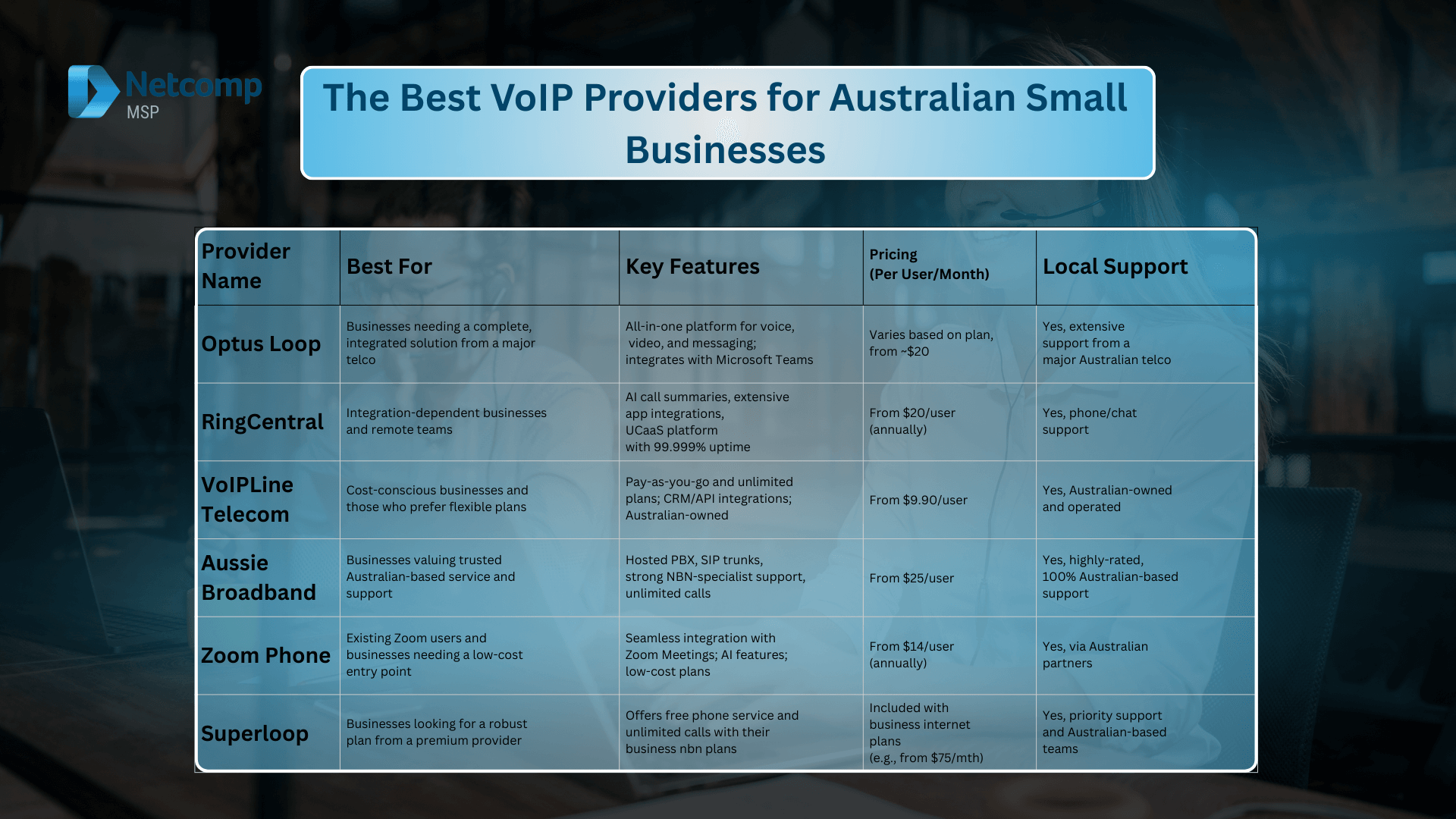Think about your business’s phone system for a moment. Consequently, does it still rely on a traditional landline? For many Australian businesses, this outdated setup means suffering from a frustrating number of missed calls and dealing with expensive bills. Furthermore, you might be struggling with hardware that is bulky and a communication system that is completely immobile. In fact, these limitations often create a professional bottleneck, stopping your team from being as flexible and efficient as they could be. Overall, clinging to a legacy phone system is increasingly becoming a competitive disadvantage in today’s digital landscape.
Nevertheless, there is a modern and more efficient solution available. Specifically, a VoIP solution transforms your business communication by using your existing internet connection instead of old phone lines. This article, therefore, serves as your detailed guide to help you navigate the world of VoIP. In conclusion, we will show you how to find a solution that not only saves money but also dramatically improves your team’s efficiency and communication capabilities. Ultimately, you will gain the knowledge to make an informed decision for the future of your business.

What is a VoIP Solution? (The Basics)
What Exactly is VoIP?
Essentially, Voice over Internet Protocol (VoIP) is simply a technology that converts your voice into digital data. This digital data is then transmitted over the internet rather than through a traditional telephone network. Consequently, this allows you to make phone calls from anywhere with an internet connection. In essence, it works much like streaming a movie or music online, but for your voice instead of video or audio files.
How Does It Work? (The NBN Connection)
To clarify, a stable internet connection is the foundation of a reliable VoIP system. Specifically, for businesses in Australia, having a quality NBN connection is absolutely critical for clear, uninterrupted calls. Furthermore, the type of NBN connection you have (FTTP, FTTN, etc.) will impact your service, so a reliable provider will assess your needs. Accordingly, the better your internet connection, the higher the quality of your call.
Essential Components of a VoIP System
Of course, using a VoIP system requires a few core components. Ultimately, the simplicity and flexibility of these components make VoIP a perfect fit for modern businesses. These include:
- IP Phones: First, these are dedicated physical phones that look and feel like a traditional phone but plug directly into your network.
- Softphones: Next, this is a software application on your computer or smartphone that functions just like a phone.
- Headsets: In addition, many businesses use headsets with built-in microphones for high-quality audio and a hands-free experience.
Top 10 Benefits of VoIP for Australian Small Businesses
Switching to a VoIP solution offers far more than just a new phone system; it’s a strategic investment in your business’s future. For this reason, modern VoIP platforms provide a suite of features that help Australian small businesses compete with larger corporations, all while staying flexible and cost-effective. Here are the top benefits you can expect to see.
1. Cost-Effectiveness: Cut Your Phone Bills
First and foremost, a major benefit is the significant cost reduction. In fact, many businesses experience average savings of 50% to 75% on their monthly phone bills after making the switch. Conversely, VoIP systems use your existing internet, eliminating the need for expensive landline rentals and separate hardware for each user. Therefore, long-distance and international calls become significantly cheaper or are even included in unlimited plans.
2. Scalability and Flexibility: Grow Without Headaches
Ultimately, VoIP systems are designed to grow with your business. For instance, you can easily add or remove users with just a few clicks from an online dashboard, without needing a technician or costly new hardware. This flexibility is perfect for businesses with seasonal staff or those planning to expand.
3. Mobility: Your Office is Everywhere
With more Australian businesses embracing remote and hybrid work, mobility is a key benefit. Specifically, your team can make and receive calls from their business number on their laptops, tablets, or smartphones using a simple app. This means staff can be productive and professional whether they’re at home, at a client’s office, or on the road.
4. Professional Features: Compete with the Big Guys
Moreover, VoIP platforms come with a wealth of advanced features that can make any small business sound more professional. These include:
- Auto-Attendant: An automated receptionist that greets callers and directs them to the right person or department.
- Voicemail-to-Email Transcription: This feature automatically converts voicemails into a text file and sends it to your email inbox, ensuring you never miss a message.
- Unified Communications (UCaaS): This seamlessly integrates your phone system with other tools like video conferencing, team chat, and file sharing, all within one platform.
5. Improved Call Quality: Crystal-Clear Connections
In the past, VoIP was known for poor call quality. However, with the reliability of Australia’s NBN network, those days are long gone. Ultimately, a good VoIP system uses high-definition (HD) audio codecs, providing a voice quality that is often clearer and more reliable than a traditional phone line.
6. Business Continuity: Stay Connected, No Matter What
If you experience a power or internet outage, a traditional landline is useless. Conversely, a VoIP system provides robust failover options. For instance, calls can be automatically forwarded to your team’s mobile phones or another location, ensuring you never lose a business opportunity due to a disruption.
7. Analytics and Reporting: Make Data-Driven Decisions
Modern VoIP systems provide powerful, user-friendly dashboards for analytics. Subsequently, you can track key metrics like call volume, average call duration, and even peak call times. Furthermore, these insights help you make smarter business decisions, such as optimising staff rosters during busy periods or identifying areas where customer service could be improved. Overall, this data turns your phone system from a simple tool into a valuable business intelligence asset.
8. Enhanced Security: Protect Your Business from Threats
With increasing cyber threats, security is a non-negotiable. Therefore, a good VoIP provider will offer robust security features, including call encryption and multi-factor authentication (MFA) for your accounts. Moreover, they will monitor for malicious activity and use secure protocols to protect your sensitive data. In conclusion, this added layer of security gives you peace of mind that your business communications are protected.
9. Simplified Management: No IT Department Needed
You don’t need to be an IT expert to manage a modern VoIP system. In fact, most platforms are designed with an intuitive, web-based interface that allows you to easily add new users, change call routing, and manage features with just a few clicks. This simplicity, therefore, frees up your valuable time to focus on what you do best: running your business.
10. Seamless Integration: Connect Your Business Tools
Finally, a major advantage of modern VoIP is its ability to integrate with the software you already use. For instance, many providers offer native integrations with popular business tools like Microsoft Teams and Customer Relationship Management (CRM) platforms such as Salesforce and HubSpot. Consequently, when a customer calls, their details automatically pop up on your screen, allowing for a personaliыed and more efficient conversation. Ultimately, this seamless connectivity creates a unified workflow that boosts productivity across your entire team.
The Best VoIP Providers for Australian Small Businesses
Choosing the “best” VoIP provider is a very personal decision. Consequently, what works perfectly for one business might not be the right fit for another. Therefore, the most important step is to assess your own needs and priorities before you begin. This guide, however, is designed to give you a clear, side-by-side comparison of some of the most prominent providers in the Australian market in 2025.

Optus Loop
As a major Australian telecommunications provider, Optus offers a robust and comprehensive VoIP solution with Optus Loop. In fact, it provides an all-in-one communication suite that includes voice, video, and messaging. It is particularly suitable for businesses that prefer to consolidate their services with a single, trusted provider. Additionally, its tight integration with Microsoft Teams makes it an excellent choice for a team that already uses the platform for daily collaboration.
RingCentral
RingCentral is renowned as a comprehensive powerhouse in the business communications space. Its strength, therefore, lies in its seamless integration capabilities with over 500 popular business applications, including Microsoft Teams, Salesforce, and Google Workspace. In addition, its AI-powered features, such as call summaries and transcriptions, make it an ideal choice for businesses that rely on data and efficiency. Despite being a global brand, it offers a robust platform well-suited to the needs of integration-hungry Australian businesses.
VoIPLine Telecom
VoIPLine Telecom stands out for its flexibility and transparent pricing, making it a strong contender for small businesses on a budget. Specifically, they offer both pay-as-you-go and unlimited plans, ensuring you only pay for what you use. Furthermore, as an Australian-owned provider, they understand the local market and offer a range of integrations and features designed to help local businesses grow.
Aussie Broadband
Aussie Broadband has built a reputation as one of Australia’s most trusted internet providers, and their VoIP offering is no different. With their Hosted PBX and SIP Trunks solutions, businesses get access to a full suite of professional features with the backing of highly-rated, 100% Australian-based support. Ultimately, their focus on reliability and quality makes them a top choice for any business that values local expertise and customer service.
Zoom Phone
For businesses already using Zoom, Zoom Phone is an obvious and extremely low-cost choice. Because it is a unified communication solution, it allows you to consolidate your phone system into the familiar Zoom interface your team already knows. This platform, therefore, is highly reliable and provides excellent call quality. It offers a great entry point for businesses that prioritise low-cost and ease of use.
It is important to know that while Netcomp Solutions doesn’t provide VoIP services directly, we can connect our clients with our trusted partners—Superloop or any other reliable provider of their choice. However, when it comes to our personal preference, we have been using Superloop for a long time, and they have proven to be a highly reliable partner. For this reason, we often recommend their services to our clients, confident in the quality of their network and business VoIP offerings.
Superloop
Superloop is a highly-rated internet service provider that also offers a compelling VoIP solution, often bundled with their business internet plans. Specifically, they provide a free business phone service and unlimited call pack with many of their plans, which is a significant value proposition. As a result, Superloop is a great choice for businesses that want a single, reliable provider for both their internet and phone services with a focus on fast, local support.
The Disadvantages of VoIP and How to Overcome Them
While the benefits of VoIP are compelling, it is important to acknowledge that the technology has some drawbacks. Acknowledging these potential issues, therefore, allows you to prepare for them in advance and ensure a seamless transition. For this reason, we’ve outlined the most common challenges and provided simple, effective solutions.
Internet Dependency
First, the most significant drawback is that a VoIP system is entirely dependent on your internet connection. Consequently, if your NBN goes down or your bandwidth is limited, your phone service will be affected. This could result in choppy audio, dropped calls, or a complete loss of service.
How to Overcome It: You can easily overcome this challenge with two key strategies. First, invest in an adequate internet plan with sufficient bandwidth, which you can calculate by allowing around 100kbps per concurrent call. Second, your IT provider can configure Quality of Service (QoS) on your router, which prioritises VoIP traffic over less time-sensitive data like downloads or streaming. Ultimately, this ensures your calls always get priority on your network.
Power Outages
Furthermore, since your VoIP phones are powered by electricity, they will not work during a power outage. This is a common concern for businesses that need to remain contactable at all times.
How to Overcome It: To combat this, you can invest in a small Uninterruptible Power Supply (UPS) for your router, modem, and primary IP phone. Additionally, you can enable a feature called call forwarding on your VoIP service, which automatically redirects all incoming business calls to a mobile phone or another location.
Emergency Services (000)
Finally, there are important limitations regarding emergency services with VoIP. Unlike a traditional landline, which is tied to a fixed physical address, a VoIP service is mobile and therefore may not automatically provide your precise location to an emergency operator. This is a critical factor to consider.
How to Overcome It: Fortunately, providers and authorities are working to solve this. First, most reputable providers will require you to register a physical address for each line, and the system relies solely on this pre-registered address for location reporting—not on real-time GPS. Secondly, for the most accurate and fastest response, you should always encourage your staff to use the free Emergency+ app on their mobile phones. This app is the best practice promoted by Australian authorities, as it uses your phone’s GPS to provide exact coordinates to the 000 operator. In conclusion, being prepared with these simple solutions ensures your team can always access emergency help when they need it.
VoIP vs. WiFi Calling: A Critical Distinction for Your Business
While both VoIP and WiFi calling use the internet to make a phone call, they are not the same thing. In fact, understanding the difference is crucial for any business looking to improve its communication. Furthermore, confusing the two can lead to a reliance on a technology that is simply not built for business use. For this reason, we will clarify the key distinctions.
Clear Definitions
First, VoIP (Voice over Internet Protocol) is a technology that allows you to make phone calls over the internet using a dedicated service. This service is independent of your mobile carrier. Conversely, WiFi Calling is a feature offered by your mobile network provider (e.g., Telstra, Optus, Vodafone) that lets you use a WiFi network to make calls when your mobile signal is weak or unavailable.
Conclusion
In summary, VoIP solutions for small businesses in Australia deliver clear advantages: lower costs, effortless scalability, seamless mobility, and advanced features that boost both productivity and customer satisfaction. Moreover, with a reliable NBN connection and the right provider, concerns about call quality or outages can be effectively managed. Consequently, VoIP stands out as a future-ready communication system that supports growth and flexibility for Australian SMEs.
Therefore, the next step is to evaluate your own organisation’s needs, from team size and budget to the specific integrations that matter most to your operations. Afterward, you can use the comparisons and practical tips in this guide to shortlist providers and plan a smooth transition away from outdated landlines.
Finally, if you would like expert guidance, feel free to contact Netcomp Solutions. Because we specialise in business IT support and cyber security—and maintain strong partnerships with trusted VoIP providers—we can help you choose and implement a solution that aligns perfectly with your goals. Ultimately, by making an informed decision today, you set your business up for smarter, more efficient communication tomorrow.



